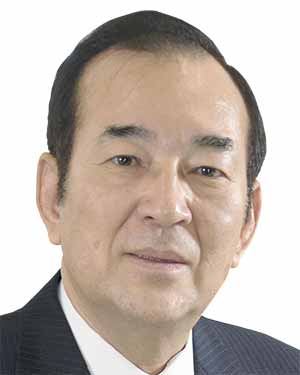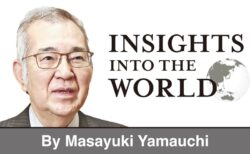13:11 JST, November 11, 2022
Chinese history teaches that any mistake by a ruler can be a sign that the country will fall into a crisis and eventually perish. According to “Shuoyuan” (“The Garden of Eloquence”) compiled by Liu Xiang, a Confucian scholar of the Western Han dynasty, certain loyal retainers dared to admonish the rulers they served. To dissuade the rulers from some action, they would use methods such as either openly remonstrating with them, or initially exhibiting obedience and then pressing gradually ahead with admonishment or euphemistic satire to demonstrate their disapproval.
The Chinese Communist Party’s 20th National Congress in October selected President Xi Jinping and six other members to Xi’s new leadership team, the Politburo Standing Committee. When necessary, will the six of them be able to engage even in euphemistic satire, as recommended by Confucius, to try to deter Xi from making a mistake? In Russia, no one in President Vladimir Putin’s entourage dissuaded him from his reckless invasion of Ukraine.
Both Xi and Putin are clinging to an emperor-like status by seeking to permanently retain their positions. To do so, they were willing to casually nullify the mandatory retirement rule in Xi’s case and the presidential tenure rule in Putin’s case and exercise unlimited authority to reshuffle personnel. Neither of them has the humility or the prudence to follow Emperor Taizong (Li Shimin) of the Tang dynasty, who was described in the Chinese collection “Zhenguan zhengyao” as always seeking remonstrances from his vassals and respecting objections.
What the Chinese and Russian leaders have in common is that they are so confident in themselves, they do not subscribe to the concept that humans cannot take on responsibilities that are beyond their capabilities. Deng Xiaoping, who was afraid of the revival of a Mao Zedong-style autocracy in China, instituted a collective party leadership. Chinese Premier Li Keqiang has shown well-balanced leadership in implementing economic policies, giving a sense of assurance to businesses and individual investors in Japan and other nations. However, the new roster of the Politburo Standing Committee comprises only party members loyal to Xi and no one is particularly well versed in economic policies.
Incidentally, Iran, which can be said to be an ally of both China and Russia, has unequivocal grounds for the lifetime tenure of its supreme leader. Since the country’s 1979 revolution, the first and second supreme leaders, the late Ayatollah Ruhollah Khomeini and Ayatollah Ali Khamenei, have exercised power comparable to or even greater than that of Xi and Putin.
Dictatorship and substitutionism
China, Russia and Iran have not yet eliminated the specter of revolution. They can be said to remain haunted by the threat of dictatorship and substitutionism, which leads to the establishment of a government over the people instead of a government of the people. Those situations emerged along with the revolutions in those three countries in the 20th century. The October Revolution of 1917 in Russia and the revolution in China that led to the establishment of the People’s Republic of China in 1949 once appeared to have finally evolved into different phases — either abandoning or upholding the communist ideology — when the Soviet Union was dissolved in 1991 and the Tiananmen Square crackdown took place in China in 1989. Still, Russia and China are alike in adopting capitalistic business models and relying on foreign capital to drive economic development.
Putin, a former case officer for the KGB, or the Soviet State Security Committee, seems to be haunted by the prospect of revolution, as he has forged a path toward the kind of autocracy that tends to come after a dictatorship of the proletariat, or of workers and peasants, transforms into a party dictatorship. Xi does not seem to have ruled out following a path on which he goes further than Mao’s philosophies, by strengthening the Chinese Communist Party’s grip on power through such measures as prioritizing support for state-owned enterprises and pursuing a zero-COVID approach that places major metropolitan areas under lockdown.
This is completely removed from the principle of checks and balances based on a collective leadership. The consequence is that the party elite cower, as they have little choice but to do what the party chief wants, even when he doesn’t express it directly, demonstrating explicit obedience to him.
It should be noted that the lack of women in the new Politburo selected during the Chinese Communist Party’s latest congress sets China apart from Iran, as Iranian women have repeatedly taken to the streets since September. Iranian women, who are protesting against their country’s supreme leader Khamenei over the death of a 22-year-old woman for breaching the hijab law, seem to be holding up a Middle Eastern mirror to the new Xi leadership, which remains haunted by the fear of revolution and is going against the tide of the times.
Khamenei and Iranian President Ebrahim Raisi, who inherited the Islamic revolution, are both conservative hard-liners, rarely showing flexibility like that of former Iranian President Hassan Rouhani. Raisi’s predecessor promoted the Joint Comprehensive Plan of Action (JCPOA), known as the Iran nuclear deal of 2015, temporarily resulting in a partial lifting of sanctions against Iran by the United States and European countries in exchange for the resumption of exports of Iranian oil. Even though hard-line rule prevails in Iran, its population can directly elect a president and still has the civic freedom to stage even nationwide protests over the death of a fellow citizen.
In contrast, in Russia, national civil campaigns against the danger of using nuclear weapons and the conscription of male adults remain sluggish. In China, it is impossible to even imagine citizens holding rallies and the like in opposition to lockdown policies and their government’s threat to reunify Taiwan by force.
The ongoing political activities in Iran may be indicative of new moves in which women are getting closer to the center stage of “revolutions” and “social activism” than in the past. German-born U.S. philosopher Herbert Marcuse once emphasized the role of “intellectuals” including university students, while German-born U.S. political scientist Hannah Arendt underlined the importance of popular “councils,” not political parties based on a centralized governance structure, as the driving force of reforms. What Marcuse and Arendt advocated differs markedly from the specter of revolution that still weighs on Russia and China.
In Iran, religious leaders assume political rule of the country in the name of “governance by the jurist” (the learned of Shiite Islam), a situation that epitomizes political substitutionism. The fact that women in Iran, who have thus far been shoved to the periphery of the Islamic governance system, are suddenly at the heart of campaigns criticizing the government is profoundly meaningful from a historical perspective.
‘Sea’ as hegemonic ambition
Now let me touch on the passing of former Soviet President Mikhail Gorbachev in August. In January 1989, Iran’s then supreme leader Khomeini sent to Moscow what effectively turned out to be his farewell note to Gorbachev. In his message, the ayatollah expressed appreciation for the perestroika political reform movement, but said that ultimately Communism would not be able to save Soviet society from devastation and that it was Islam that could resolve the Soviet crisis.
Later on, I wrote a book titled “Hinshi no Leviathan” (“The Dying Leviathan”) with a section specifically on Khomeini and Gorbachev. In it, I wrote that the Iranian religious leader’s long-cherished wish was to liberate Muslims in not only Iraq and the Gulf states but also then Soviet territory in Central Asia and the Caucasus from “atheist rule.” In the wake of the dissolution of the Soviet Union, those areas in Central Asia and the Caucasus became independent sovereign states. The wave of Shiite revolutions has spread to Iraq, Syria and Lebanon.
The difference between then and now is that Iran under the leadership of Khamenei and Russia ruled by Putin cooperate with each other as de facto allies in Syria’s civil war and the war in Ukraine to try to keep the United States and its European allies at bay. Moreover, Russia has been getting Iran to provide it with suicide drones to attack Ukraine in its desperate attempt to turn the tide in its favor.
The common keyword for Russia, China and Iran is “sea.” Russia has been trying to gain naval command of the Black Sea by taking control along Ukraine’s coastline. China aims to achieve hegemony from the East and South China Seas to the Western Pacific. To that end, it will likely try to realize its grand strategy to merge Taiwan into the Chinese mainland and inevitably pursue its geopolitical ambition to the Senkaku Islands in Okinawa Prefecture and Okinawa itself. Iran’s hegemonic ambition is based on the Shiite crescent that enables it to serve as a land bridge to connect the Persian Gulf and the Mediterranean Sea.
Going back to the Chinese Communist Party congress, TV footage showed former Chinese President Hu Jintao’s disorderly exit from the closing event. Whatever the truth might be about infighting within the party over the personnel changeover, it appeared that no respect was paid to Hu, one of China’s senior leaders. The scene looked obviously unnatural to Chinese and Japanese people, who cherish the tradition of respecting the elderly and observing the order of seniority.
Socrates, responding to those who noticed in his countenance a certain inclination to vice, admitted that it was his natural propensity, but which he had corrected by discipline, according to “Essais,” Book II, Chapter 11, by Michel de Montaigne. Discerning what someone’s facial expression means may be part of the art of reviewing classical writings. Nevertheless, it would not be unreasonable for politicians of today to follow the example of Socrates and correct their inclination to vice when someone notices it.

Masayuki Yamauchi
Yamauchi is a professor at Musashino University and a professor emeritus at the University of Tokyo, where he previously headed the University of Tokyo Center for Middle Eastern Studies (UTCMES).
Top Articles in Editorial & Columns
-

Riku-Ryu Pair Wins Gold Medal: Their Strong Bond Leads to Major Comeback Victory
-

40 Million Foreign Visitors to Japan: Urgent Measures Should Be Implemented to Tackle Overtourism
-

China Provoked Takaichi into Risky Move of Dissolving House of Representatives, But It’s a Gamble She Just Might Win
-

University of Tokyo Professor Arrested: Serious Lack of Ethical Sense, Failure of Institutional Governance
-

Policy Measures on Foreign Nationals: How Should Stricter Regulations and Coexistence Be Balanced?
JN ACCESS RANKING
-

Japan PM Takaichi’s Cabinet Resigns en Masse
-

Japan Institute to Use Domestic Commercial Optical Lattice Clock to Set Japan Standard Time
-

Israeli Ambassador to Japan Speaks about Japan’s Role in the Reconstruction of Gaza
-

Man Infected with Measles Reportedly Dined at Restaurant in Tokyo Station
-

Videos Plagiarized, Reposted with False Subtitles Claiming ‘Ryukyu Belongs to China’; Anti-China False Information Also Posted in Japan























